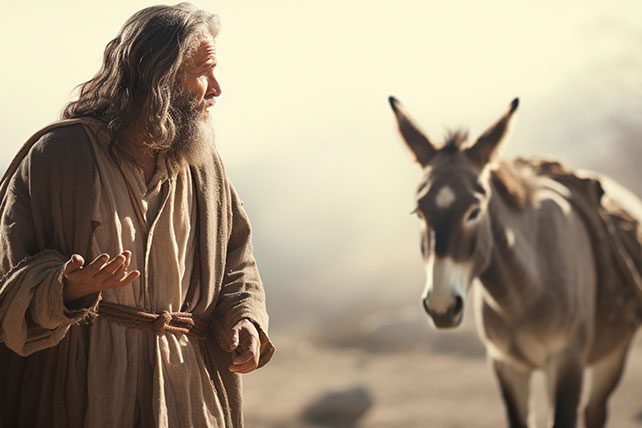In the vast expanse of biblical narratives, the story of Balaam stands out as a compelling tale of prophecy, moral dilemmas, and divine intervention. Balaam, a prophet and priest-diviner, occupies a unique place in the Bible, blending the lines between devotion and defiance. His story, infused with mysterious characters and divine messages, offers a rich field for theological and moral exploration.
This blog post delves into the multifaceted character of Balaam, unraveling his story, teachings, and the profound legacy he left in biblical history.
Who Was Balaam in the Bible?
Balaam was a renowned prophet and diviner in the Bible, known for his ability to pray to and invoke deities from various cultures, including those considered evil or pagan. His reputation as a powerful seer reached Balak, the king of Moab, who sought his services to curse the Israelites as they encamped near his borders.
Despite his pagan background, Balaam is a complex figure who communicates with the God of Israel, demonstrating the Bible’s nuanced portrayal of foreign prophets and the universal reach of divine revelation.
RELATED: How Do We Explain Talking Donkeys and Burning Bushes?
The story of Balaam is primarily documented in the Book of Numbers, chapters 22 through 24. It begins when Balak, the king of Moab, observes the Israelites’ victories over the Amorites and grows fearful of their presence.
In desperation, he sends messengers to Balaam, offering riches in exchange for cursing the Israelites. Initially, God instructs him not to go, but upon Balak’s persistence, He allows him to proceed with a warning to only speak God’s words.
As Balaam sets out on his journey, he encounters a divine angel, invisible to him but visible to his donkey. After the donkey avoids the angel three times, resulting in Balaam’s anger and subsequent beatings, the donkey miraculously speaks, reprimanding him and opening his eyes to the angel’s presence. The angel reiterates God’s command to only deliver His message. When he finally meets Balak, he blesses the Israelites instead of cursing them, much to Balak’s dismay, reciting prophecies that highlight Israel’s future success and dominance.
The Doctrine of Balaam
The doctrine of Balaam refers to teachings that the New Testament attributes to Balaam, which led the Israelites into sin. This concept is mentioned in the books of Revelation and 2 Peter. The “doctrine” is understood to be his advice to Balak on how to weaken the Israelites spiritually since he could not curse them directly. He suggested that Moabite women should entice the Israelite men into idolatry and immorality, leading them away from their allegiance to God.
This insidious strategy resulted in a plague upon the Israelites as a divine punishment for their sins. The doctrine of Balaam thus symbolizes a warning against the seductions of false teachings and the importance of remaining faithful to divine commandments.
Balaam’s Prophecy
Balaam’s prophecy, contained within his four oracles, is a significant element of his biblical narrative. Contrary to King Balak’s intentions, his prophecies, divinely inspired, bless rather than curse the Israelites. His oracles are rich with messianic foresight and visions of Israel’s future prosperity.
The most notable among these is the prophecy that a star will come out of Jacob, a scepter will rise out of Israel (Numbers 24:17), which has been interpreted by many as a foretelling of the coming of the Messiah. his words underscore the irrevocable nature of God’s blessings on Israel, despite external threats and the nation’s own failings. His prophecies highlight the paradox of a pagan prophet speaking divine truths, serving as a testament to God’s sovereignty and the unexpected ways in which His will is manifested.
The Speaking Animal
One of the most memorable and unusual aspects of Balaam’s story is his encounter with a speaking animal. When he sets off to meet Balak despite divine warnings, his donkey sees an angel of the Lord standing in the way and turns aside three times. Frustrated, Balaam beats the donkey, until God miraculously opens the animal’s mouth, allowing it to speak and rebuke Balaam.
This extraordinary event not only highlights the donkey’s perceptive abilities compared to the blind prophet but also serves as a divine intervention to redirect his path and intentions, emphasizing the unexpected ways God can communicate.

